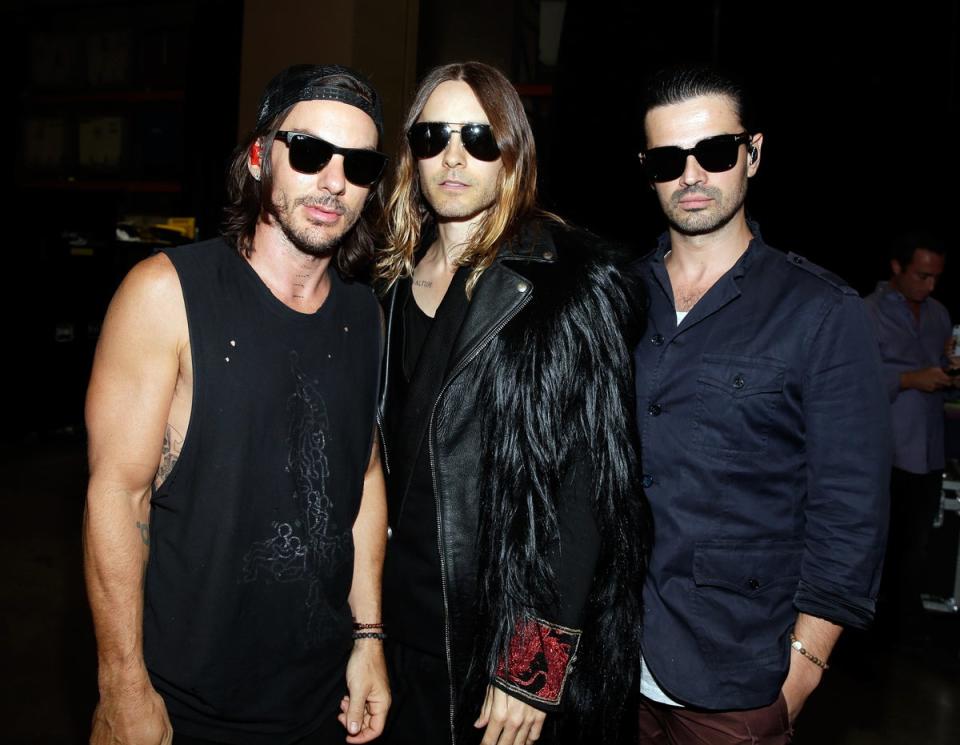Is Jared Leto’s Thirty Seconds to Mars the most absurd vanity project in Hollywood history?

- Oops!Something went wrong.Please try again later.
- Oops!Something went wrong.Please try again later.
Jared Leto has been keeping busy. As the vampire superhero star of Morbius, he recently treated an unsuspecting and undeserving world to a ready-made cult classic – a movie so awful yet so addictive it forced us to consider whether “terrible” and “genius” might not be the same thing. But the 50-year-old Oscar winner is merely getting started. He recently revealed to Kerrang! that during lockdown he turned his attention back to his rock band, Thirty Seconds to Mars.
“I wrote about 200 songs,” he said. “And we have maybe two albums, maybe three, worth of material. We’re going to start putting it out momentarily.”
Three new Thirty Seconds to Mars albums? Two hundred songs? Forget the climate crisis or runaway inflation. Here is the nightmare we never saw coming. Because while Leto is one of the great actors of his generation, with Thirty Seconds to Mars he has achieved the no-less-remarkable feat of fronting one of the most absurd vanity projects in Hollywood history. If Morbius the magic vampire was a rock band, it would be Thirty Seconds to Mars – a shouty, scary riot of ego, hair, melodrama and teeth.
What’s even more impressive is the sheer length of time Leto has kept Thirty Seconds to Mars – formed in 1998 with drummer brother, Shannon – in high orbit. On 27 August, it’s the 20th anniversary of the band’s self-titled debut – a record that combined the self-awareness of U2, the humility of The 1975 and the subtlety of Muse during their peak conspiracy theory years. All of it is topped off with movie-star chutzpah, histrionic vocals and howling guitars.
On the face of it, the over-the-top quality of 30 Seconds to Mars was hardly unique. Ludicrous Hollywood rock bands have been an unfortunate fact of life going at least as far back as the 1990s. Remember the band P – the jokey grunge outfit Johnny Depp formed with Butthole Surfers frontman Gibby Haynes and who were on stage at Depp’s Viper Club when River Phoenix collapsed in the street outside in 1993?
Keanu Reeves, for his part, played Glastonbury as bassist with Dogstar in 1999 and was pelted with fruit for his troubles. Russell Crowe has, meanwhile, long waged a gladiatorial battle with good taste via his pub-rock outfit 30 Odd Foot of Grunts. Chuck a plectrum over your shoulder in the 1990s and chances are it would hit a male movie star who felt their true calling was giving expression to the Kurt Cobain within.
Leto’s Thirty Seconds to Mars were always something else. For one thing, it was impossible to dismiss them as the extra-curricular dalliance of a bored A-lister. Leto, from the beginning, took the band as seriously as any of his screen roles.
This he made clear with their debut single, “Capricorn (A Brand New Name)”. In the video, Leto wears a ridiculous white jumpsuit and howls, “So I run, and hide and tear myself up/ Start again with a brand new name”. He does so with the same searing ardour that he bought to his breakout role as a drug addict two years previously in Darren Aronofsky’s Requiem for A Dream.

That first album quickly found an audience. It sold over 100,000 copies and served as a springboard for Thirty Seconds to Mars’s subsequent ascent to arenas. Critics, though, were less than impressed by Jared and Shannon’s cobbling together of Pink Floyd, Nine Inch Nails and U2. Nor were they wooed by Leto’sbombastic lyrics which, he explained to Flaunt magazine, sprang from “a definite desire for change, for renewal, for a new beginning and ultimately, for escape”.
“The album is undone by Leto’s baffling, pretentious poetry and the sanitised quality of the heavy guitars,” tutted Rolling Stone. “Leto’s delivery of his earnest, sci-fi-tinged lyrics gets monotonous over the course of the album,” agreed Q.
Whatever about Rolling Stone, it turned out that “baffling” and “pretentious” were just what Leto’s fans wanted. And if critics never came around throughout the four ensuing LPs the group would release up to 2018, their fanbase grew and grew. They played London’s O2 Arena on three occasions, in addition to featuring prominently on the bills at the Reading and Leeds festivals and Download.
Their relationship with their fans from the outset had the quality of hero worship. From early on in the love affair, Thirty Seconds to Mars would cheerfully describe their following – who refer to themselves as “the Echelon” – as “a cult”.
Three years ago, Leto took the logical next step by inviting hardcore devotees to a retreat in Croatia. Under the blistering heat, on a private island in the Adriatic, the singer/actor wore white robes and attendees participated in yoga classes and received tattoos.
Yes, this is a cult 🔺 #MarsIsland pic.twitter.com/4I7JROg90w
— THIRTY SECONDS TO MARS (@30SECONDSTOMARS) August 15, 2019
The event was called “Mars Island”. Photos of Leto leading his cowled followers suggested that it was indeed something from another planet. But it was a success and Leto did it all over again in 2021, with members of the Echelon paying from $1,500 to $6,500 for their “exclusive” Thirty Seconds to Mars experience (the $6,500 tier bought you a “VIP activity with Jared”).
Yet even as the Echelon expanded, others were siding with the critics. Frodo himself, Elijah Wood, was one of the first to fire shots. In 2003 he declared Thirty Seconds to Mars “F***ing awful, man!” (Leto would later confront Wood at an awards ceremony.)
“F***ing awful” is a description that will register with many who have encountered the band in the wild. It isn’t that people dislike Leto’s stagy space rock. The negativity goes so much deeper. Something about Thirty Seconds to Mars stirs up a visceral antipathy that eclipses the disdain in which other movie star rock projects are held.
“I find them excruciatingly generic, and their albums simply do not move me at any level,” wrote one Reddit user when a Leto fan wondered why Thirty Seconds to Mars provoked such hate. “Jared Leto comes across as a pretentious tool, both the way he sings and the music videos,” went a more succinct response.
Pretentious or not, Thirty Seconds to Mars undoubtedly stand at the nexus of two unfashionable cliches: overblown stadium rock and Hollywood egotism.
That grandiosity has been front and centre of their music from the start. Their self-titled debut mixed Meatloaf with emo – topped off with appropriately showy production from Pink Floyd/Nine Inch Nails wingman Bob Ezrin. Not much had changed by 2018 and on their most recent album, America, Leto was still singing like a banshee fresh from a cleansing retreat and addressing themes such as the death of the American dream and sexuality, in terms that made Bono sound like Mark E Smith.

“Across a land of blood and dreams… I will save your heart from breaking,” he crooned on “Great Wide Open”. Meanwhile, on the synth-driven “Dangerous Night” he observed, “I, I am a man on fire/ You, a violent desire”. Behold the rock-opera Zoolander we didn’t know we needed.
Credit must, of course, go to Leto for keeping the band going for 20 years. They’ve seen off terrible reviews, hobbit-hate and a $30m lawsuit from their former label EMI. That protracted legal battle was chronicled in their 2012 film Artifact, which plausibly cast Thirty Seconds to Mars as victims of music industry avarice after they attempted to walk away from what they regarded as an inequitable contract (the dispute ultimately settled out of court).
If anything, the fact that Thirty Seconds to Mars remain polarising two decades on from their debut is a backhanded testament to their success. Ryan Gosling, Kevin Bacon and House of the Dragon’s Paddy Considine have all been in groups, with the latter releasing an acclaimed album this year. Can you name any of them?
With Thirty Seconds to Mars, Leto has been thrilling fans and riling critics for one-fifth of a century. Whatever you think about his music – and we can agree it is divisive – you can’t argue with his longevity. Or with his ability to put out songs that, just like Morbius, have left their mark on popular culture.

